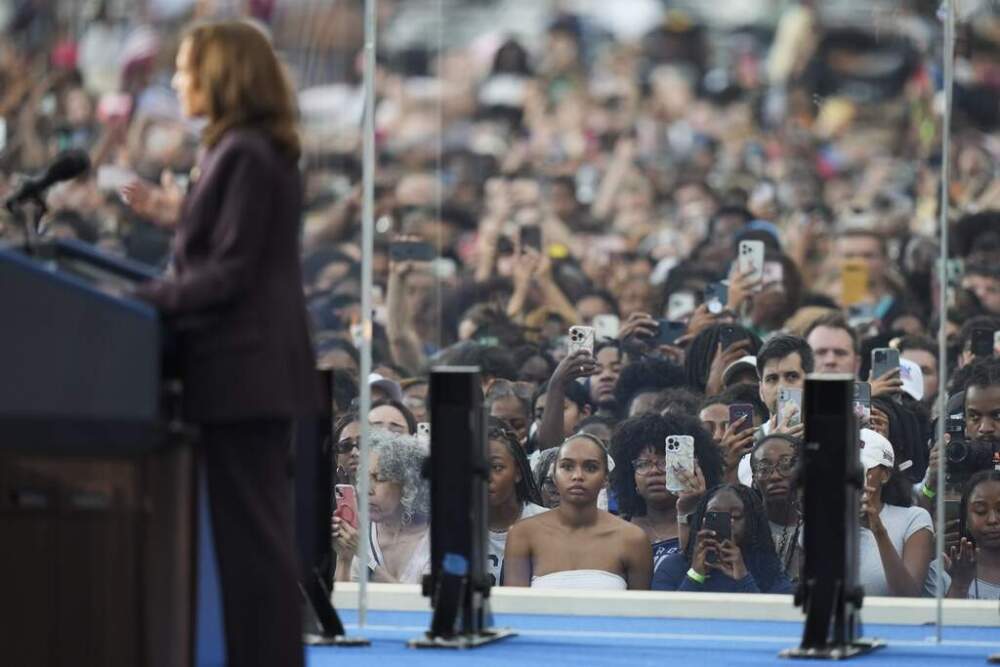Advertisement
Cog's Weekly Newsletter
Processing the election

Editor's Note: This essay appeared in Cognoscenti's newsletter of ideas and opinions, delivered weekly on Sundays. To become a subscriber, sign up here.
Since Donald Trump was declared the president-elect, I have been trying to make sense of things. How could Vice President Kamala Harris, with her $1 billion purse and massive field operation, lose every battleground state? How could a twice-impeached convicted felon win back the White House? I’ve been reading news analysis and scrolling social media, talking to friends and family.
There are many theories that try to explain how Trump won. Here are some. The American people hate women. The mainstream media sanewashed Donald Trump. President Joe Biden should have stepped aside earlier, allowing for a Democratic primary. Voters chose Trump not in spite of his criminality, misogyny, racism and xenophobia, but because of it. The Democrats had a bad message and lost the thread. It was the economy, inflation, the price of eggs, the cost of a home. This is just another example of the anti-incumbent trend we’ve seen in elections around the world. People — and especially working class people — have lost faith in the ability of American institutions to care for them. They bet on Trump as an agent of change.
Maybe some version of all of these things are true. I suspect we’ll know more in time.
Reactions to Trump’s return to the White House have been just as varied, from joy and rage, to hope and despair, glee and fear. Many women are despondent that after 248 years of a man in the White House, we’re headed for four more. Immigrants fear mass deportations. The New Yorker, Vanity Fair and others are re-circulating their mission statements and reminding readers that Trump demonizes and threatens journalists.
Meanwhile, more than half of American voters got the result they desired. When all the votes are tallied, it’s likely Trump will win the popular vote for the first time during his three runs for the White House; it’s also the first time a Republican presidential candidate has done so in 20 years.

There is a rush to know and understand all of this. I don’t have many answers at the moment, but I’m also not convinced it’s a good idea to try to settle them so quickly.
I have wondered, in the news-filled hours since Tuesday, if the work we are doing at Cog actually matters. How are we inviting people to think differently? What are we helping our readers and listeners learn on the way to becoming more informed citizens and human beings? I hope we’re doing those things, though I suppose I can’t know for sure. I think there is value in opening the floor to contributors who are thoughtful, smart, empathetic people and writers, and in being a place for connection after this historic election season. Those guiding principles informed the week.
Are the political differences within Laura McTaggert’s community of veterans insurmountable? Do Steve Almond’s “politics of mercy” have a place in America? What does Trump’s ascension say, in Eileen McNamara’s phrasing, about the “unseriousness of our culture”? Is the answer for people disappointed in the results to focus their efforts locally, as Miles Howard argues?
Advertisement
In the midst of all this, I have also been thinking about hope. But not, I think, in a vapid, blind optimism sort of way. Hope, to me, has a warm sensation; it signals possibility and imagination, though it never promises certainty. A smart person I know defines the concept of hope in relation to the oft-quoted Rainer Maria Rilke poem, “Go to the limits of your longing.” That one includes the lines “Let everything happen to you: beauty and terror” and “no feeling is final.” In my friend’s reinterpretation, hope is the feeling you have when you know that no feeling — good or bad — is permanent.
My three little girls asked me a question Wednesday morning. It’s one they’ve asked me before: “Will there ever be a lady president?”
My answer: Maybe. One day.
Follow Cognoscenti on Facebook and Instagram. And sign up for our weekly newsletter.
